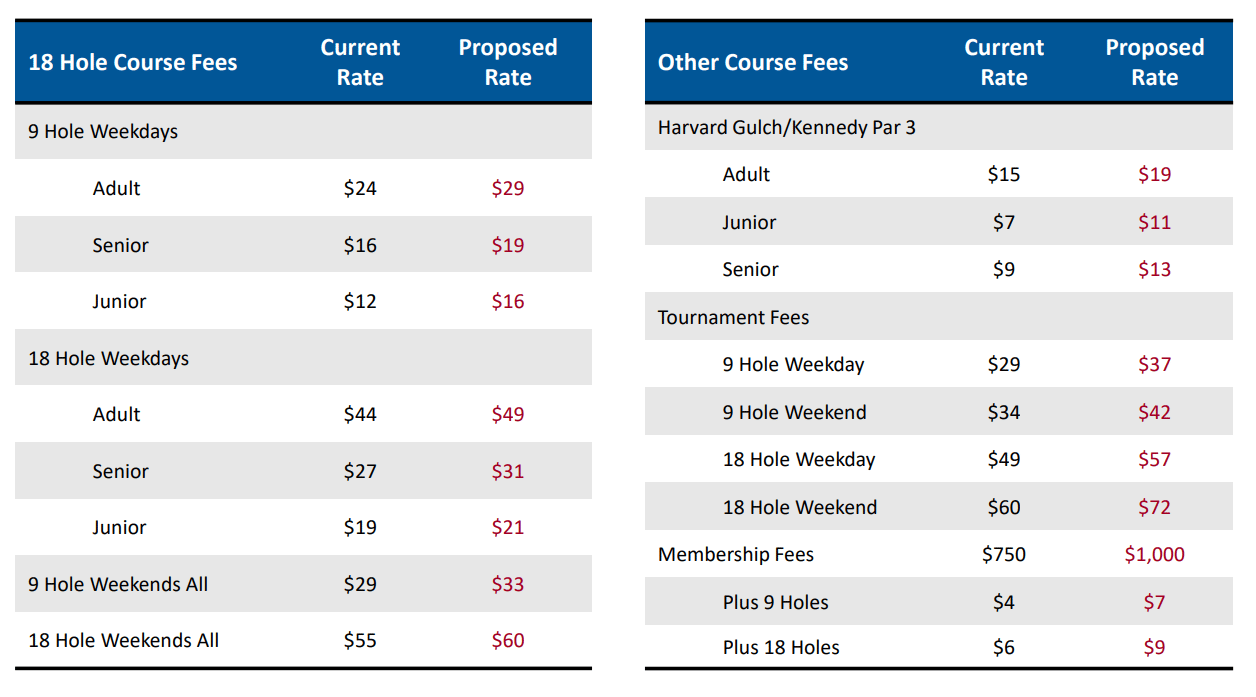Tee time at Denver-owned golf courses is likely about to get pricier.
The city’s parks and recreation department wants to increase the maximum cost of playing at all of its courses — whether nine or 18 holes, weekday or weekend — as part of a series of changes to fees across its facilities.
Currently, an adult pays $44 to play 18 holes on weekdays and $55 on weekends. The department wants to increase that to $49 and $60.
The cost of playing nine holes would jump to $29 on weekdays and $33 on weekends, a jump of $5 and $4, respectively. Par three courses such as Harvard Gulch and Kennedy would see adult play increase from $15 to $19, regardless of day.
The department estimates the changes would bring in an additional $2 million in revenue for the golf division next year, bumping it from $16.8 million to $18.8 million.
That projection assumes that the fee increase would reduce demand somewhat. The department estimates it would see 415,000 rounds without the changes, and 400,000 with them.
The department needs the Denver City Council to sign off on the fee changes. Parks and Recreation Special Projects Manager Alaina McWhorter briefed a council committee on the proposal last week.
“We remain the most affordable golf opportunity in the Front Range region,” she said.
Golf is an “enterprise division” for the parks and recreation department, McWhorter said. That means it is expected to generate enough revenue to cover 100 percent of its costs. The department estimates that, if the changes are enacted, the division would actually cover 115 percent of its costs next year.
“This does not mean they’re a profit-generating enterprise,” McWhorter said of the division. “It just means that they are able to have the flexibility to continue enhancing their services and programs, as well as respond to unexpected capital or maintenance costs.”
Other changes to fees that the department wants to see implemented include increasing the cost of renting park facilities such as the City Park Pavilion, eliminating fees for hand-launched watercraft such as sailboats in the five city lakes that allow them and bumping up the price of staying in an RV at Chief Hosa Campground.
But McWhorter said the increase in golf greens fees would account for 80 percent of the expected additional revenue across all the changes.
The committee forwarded the proposal to the full council, where a majority of members will need to vote in favor.
Prior to voting, Councilwoman Jamie Torres noted that the proposed cost of play was up $4 or $5 in each category and questioned why the cost increase wasn’t more proportional — say, the cost of nine holes going up $2.50 while the cost of 18 holes increases $5.
“Water, fertilizer, labor, etc. — all of those costs are going up regardless of what type of round it is,” Director of Golf Scott Rethlake responded.
Rethlake also noted that the above figures are technically the maximum price the department can charge, not the mandatory price.
“The fees that we’re asking for aren’t necessarily the fees that we’re going to be charging,” Rethlake said. “We do have competition in the area … so we’re kind of driven by supply and demand. We’re not going to price it where someone isn’t going to play it.”
Tee time at Denver-owned golf courses is likely about to get pricier.
The city’s parks and recreation department wants to increase the maximum cost of playing at all of its courses — whether nine or 18 holes, weekday or weekend — as part of a series of changes to fees across its facilities.
Currently, an adult pays $44 to play 18 holes on weekdays and $55 on weekends. The department wants to increase that to $49 and $60.
The cost of playing nine holes would jump to $29 on weekdays and $33 on weekends, a jump of $5 and $4, respectively. Par three courses such as Harvard Gulch and Kennedy would see adult play increase from $15 to $19, regardless of day.
The department estimates the changes would bring in an additional $2 million in revenue for the golf division next year, bumping it from $16.8 million to $18.8 million.
That projection assumes that the fee increase would reduce demand somewhat. The department estimates it would see 415,000 rounds without the changes, and 400,000 with them.
The department needs the Denver City Council to sign off on the fee changes. Parks and Recreation Special Projects Manager Alaina McWhorter briefed a council committee on the proposal last week.
“We remain the most affordable golf opportunity in the Front Range region,” she said.
Golf is an “enterprise division” for the parks and recreation department, McWhorter said. That means it is expected to generate enough revenue to cover 100 percent of its costs. The department estimates that, if the changes are enacted, the division would actually cover 115 percent of its costs next year.
“This does not mean they’re a profit-generating enterprise,” McWhorter said of the division. “It just means that they are able to have the flexibility to continue enhancing their services and programs, as well as respond to unexpected capital or maintenance costs.”
Other changes to fees that the department wants to see implemented include increasing the cost of renting park facilities such as the City Park Pavilion, eliminating fees for hand-launched watercraft such as sailboats in the five city lakes that allow them and bumping up the price of staying in an RV at Chief Hosa Campground.
But McWhorter said the increase in golf greens fees would account for 80 percent of the expected additional revenue across all the changes.
The committee forwarded the proposal to the full council, where a majority of members will need to vote in favor.
Prior to voting, Councilwoman Jamie Torres noted that the proposed cost of play was up $4 or $5 in each category and questioned why the cost increase wasn’t more proportional — say, the cost of nine holes going up $2.50 while the cost of 18 holes increases $5.
“Water, fertilizer, labor, etc. — all of those costs are going up regardless of what type of round it is,” Director of Golf Scott Rethlake responded.
Rethlake also noted that the above figures are technically the maximum price the department can charge, not the mandatory price.
“The fees that we’re asking for aren’t necessarily the fees that we’re going to be charging,” Rethlake said. “We do have competition in the area … so we’re kind of driven by supply and demand. We’re not going to price it where someone isn’t going to play it.”


